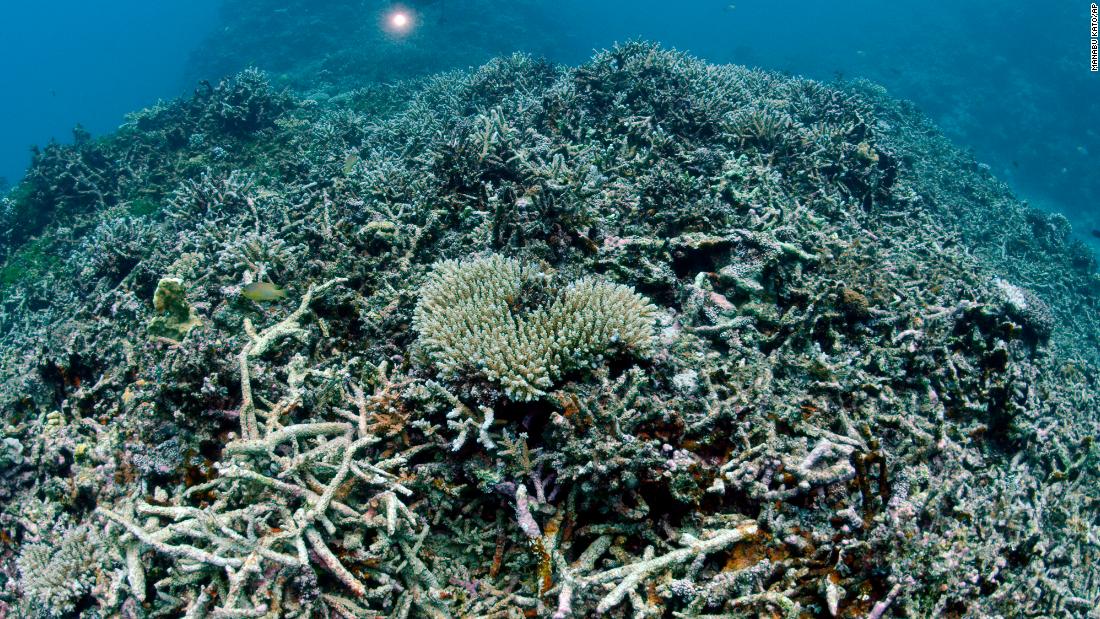 Marc Benioff is chairman and co-CEO of Salesforce.Marco Lambertini is director general of WWF International.They are members of the Friends of Ocean Action , a group of more than 50 leaders who are fast-tracking solutions for a healthy ocean.The Friends of Ocean Action is convened by the World Economic Forum and the World Resources Institute.
Marc Benioff is chairman and co-CEO of Salesforce.Marco Lambertini is director general of WWF International.They are members of the Friends of Ocean Action , a group of more than 50 leaders who are fast-tracking solutions for a healthy ocean.The Friends of Ocean Action is convened by the World Economic Forum and the World Resources Institute.
The opinions expressed in this commentary are their own.
To many people, our oceans seem far too big and too powerful to fail.But the same was once said of history’s most famous “unsinkable” ship — the Titanic.
This hubris is the root cause of the dire problems now facing our seas.It’s up to governments, individuals and, most importantly, businesses, to lead the charge in saving our oceans before it’s too late.Approximately half of the world’s oxygen — every other breath we take — is produced by the ocean.
The largest ecosystem on Earth, the ocean provides food to more than a billion people , sustains millions of jobs and generates trillions of dollars in revenue .Its majestic beauty provides us with a priceless source of inspiration.
Yet, research from leading scientists and the UN assessments highlights the pace at which ocean ecosystems are failing, marine wildlife populations are shrinking and species are vanishing.The World Wide Fund for Nature’s Living Planet report revealed that in a little over 40 years — less than an average single lifetime — global wildlife populations have declined by 60%.
This loss is not only ecologically, socially and economically untenable — it is morally unsustainable.Our planet will be less whole without endangered species like the vaquita porpoise , Hawaiian monk seal and North Atlantic right whale.The planet’s shallow water coral reefs are now down to about half their original extent and 30% to 50% of the world’s mangroves are already gone.This tragedy for biodiversity is becoming a humanitarian crisis.
There is much to be done and no time to waste.Read More 7 startling facts about the crisis facing our oceans First, we must listen to the voices of youth around the world rallying us to do more to slow climate change and protect the planet.We must ensure that governments stay the course — or go bigger — on their commitments to reduce and limit warming under the Paris Accord.But the fate of our planet cannot be the responsibility of national governments alone.
We need states, cities and every individual to reduce their carbon footprints.With 7 billion people on the planet, small actions can amount to a better climate future for our planet.Second, we need more safe spaces for biodiversity in our oceans.Only about 2% of our oceans are properly protected , with 7% under some form of protection .Some of our best scientists suggest that to make a difference, we must protect 30% to 50% of our oceans .
If we’re thoughtful about where we create these conservation areas, there are multiple wins within reach.For example, protecting and restoring our mangrove coastal forests, which absorb carbon, can help slow warming, rebuild fish populations, protect epicenters of biodiversity and safeguard essential nutrition to vulnerable communities.Third, businesses must step up to protect the oceans.They can take action by going carbon neutral, reducing their use of plastics and committing some of their technology to protecting our seas.For example, we’ll soon be able to use artificial intelligence to recognize whale songs to help shipping vessels slow down to avoid running over these endangered species.
It is said that over 90% of the world’s trade is carried by sea.This means businesses should play a more active role in ensuring their marine shipping partners are helping to build up, rather than degrade, ocean health.This can include looking more carefully at their commitments to reduce emissions in their fleets.More Tech & Innovation Perspectives Facebook’s Libra cryptocurrency is a tool for empowerment.Not a threat
I’m developing AI that can read emotions.
It’s not as creepy as you think.
Big Tech can’t be trusted.It’s time for regulation
Some economists say the ocean economy is set to double in value by 2030.This presents exciting business opportunities — but also perils.Businesses must invest thoughtfully to guide this growth — whether in areas like marine renewable energy or marine biotech — in directions that benefit ocean health, as well as the bottom line.Businesses can also easily help the ocean through the choices made about food in the office and at events.
Using simple guides , they can select more sustainable seafood, giving at-risk species a break and avoiding seafood associated with slavery and labor abuses.Businesses should also empower employees who are interested in oceans to commit the time to volunteer in service of the seas.
This can be as simple as volunteering to clean up a local beach, or as complex as coding blockchain tools to track sustainably caught fish from ship to plate.Finally, businesses should commit to supporting the ocean-focused NGOs that are helping to shape policy and action for our oceans, as well as funding ocean science at the universities that are delivering the data we will need to manage and sustain our future oceans.We cannot let our oceans fail.This planet of ours has no life boats for escape..